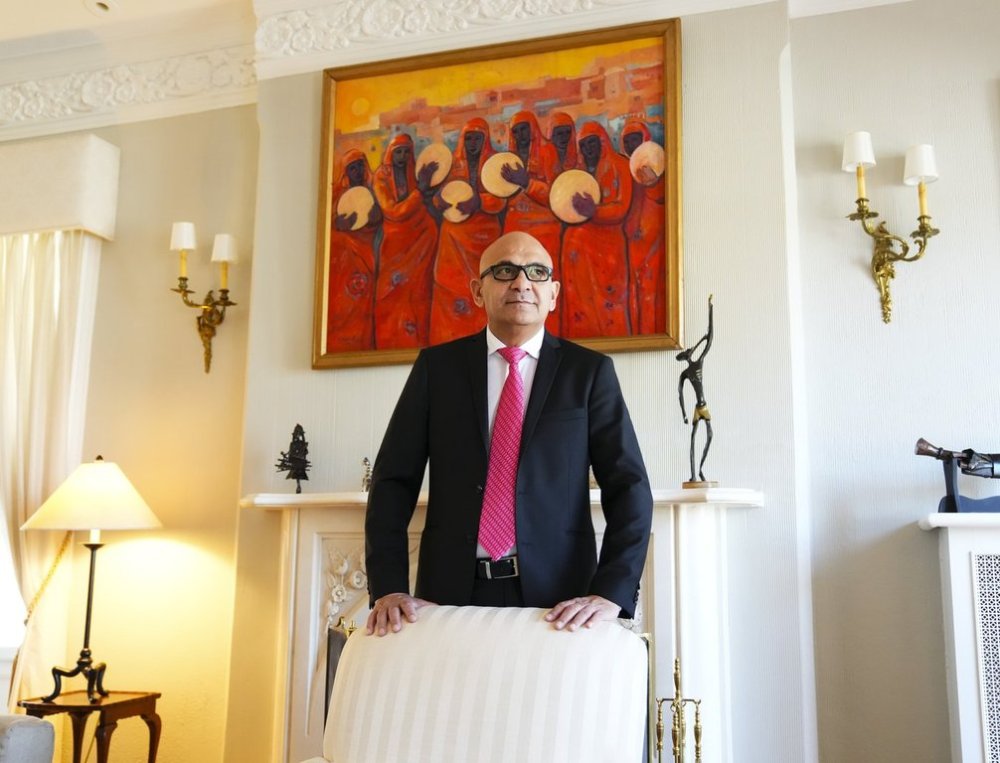‘Gas-for-wine’: South Africa seeks deal to boost trade, investment with Canada
Advertisement
Read this article for free:
or
Already have an account? Log in here »
To continue reading, please subscribe:
Monthly Digital Subscription
$0 for the first 4 weeks*
- Enjoy unlimited reading on winnipegfreepress.com
- Read the E-Edition, our digital replica newspaper
- Access News Break, our award-winning app
- Play interactive puzzles
*No charge for 4 weeks then price increases to the regular rate of $19.00 plus GST every four weeks. Offer available to new and qualified returning subscribers only. Cancel any time.
Monthly Digital Subscription
$4.75/week*
- Enjoy unlimited reading on winnipegfreepress.com
- Read the E-Edition, our digital replica newspaper
- Access News Break, our award-winning app
- Play interactive puzzles
*Billed as $19 plus GST every four weeks. Cancel any time.
To continue reading, please subscribe:
Add Free Press access to your Brandon Sun subscription for only an additional
$1 for the first 4 weeks*
*Your next subscription payment will increase by $1.00 and you will be charged $16.99 plus GST for four weeks. After four weeks, your payment will increase to $23.99 plus GST every four weeks.
Read unlimited articles for free today:
or
Already have an account? Log in here »
OTTAWA – As Prime Minister Mark Carney heads to Johannesburg for the G20 summit, Canada and South Africa are talking about a deal to boost bilateral trade and investment that could see more South African wine on Canadian shelves in exchange for gas exports.
“We are pursuing a strategic partnership with Canada,” South African High Commissioner Rieaz Shaik told The Canadian Press. “I’m calling it a gas-for-wine deal.”
Shaik said the talks are focused on five sectors — agribusiness, infrastructure, mining, energy and advanced technologies — and the final deal likely would take the form of a foreign investment promotion and protection agreement.

The agreement, he said, would be one focused on expanding private sector engagement rather than a conventional trade deal focused on goods.
He said the main hurdle is sorting out a “mutually acceptable dispute-resolution mechanism” for these sectors.
He said senior South African officials plan to visit Saskatchewan soon, which is “light-years ahead” on moving seed products to markets that are seeking more non-meat protein sources. Shaik said South Africa also wants to learn from Canadian cold-chain systems to prevent food spoilage.
He said South Africa wants provincial liquor boards to sell premium and niche wines from his country, which is launching a marketing campaign next week aimed at shifting imports away from cheaper bulk wine.
Shaik said his country is interested in buying liquefied natural gas from Canada if the export infrastructure is in place. Canadian firms are helping South Africa shift to cleaner coal as it tries to wean itself off fossil fuels.
He said Ottawa could use its Export Development Canada and FinDev Canada agencies to help Canadian investors turn a profit through large infrastructure projects South Africa is developing.
Shaik said the ongoing merger of Anglo American and Teck Resources into a single critical minerals firm in Vancouver called Anglo Teck will be “a game-changer” in copper exports. South Africa also has expertise in deep mining that could benefit Canada, he added.
Co-operation between Canada and South Africa in tech sectors could extend to advanced manufacturing, artificial intelligence and the use of nuclear technology, he said.
South African President Cyril Ramaphosa is hosting the G20 leaders’ summit this week, and he and Carney could speak about the ongoing trade talks as soon as Friday. Shaik said both heads of government are “number crunchers” who want results.
Federal officials — who briefed journalists on Carney’s visit to South Africa and the United Arab Emirates this week on the condition they not be named — said Canada is trying to build a framework for closer commercial and diplomatic relations with South Africa.
Shaik said South Africa, like Canada, sees itself grappling with trade dependence on the U.S. market. He compared efforts to establish a continent wide free-trade area in Africa to Canada’s work to end interprovincial trade barriers.
“We are so fascinated now about Canada, because (of) when we see the similarities,” he said.
“Our own industries became far too dependent on easy trade. It didn’t seek innovation. It didn’t seek productivity. It didn’t seek sweating capital to make it work, to create employment.”
Shaik also said South Africans fondly remember Canada’s vital role as “the principal engine fighting against the apartheid government” through trade unions and government advocacy.
He said Ottawa is remembered for its “tremendous assistance” in helping South Africans establish a functional democracy with a strong constitution.
“I call it a family relationship because of the strong beginning,” he said. “This relationship, it is there but it is not dynamic and it’s not interactive.”
This report by The Canadian Press was first published Nov. 18, 2025.

